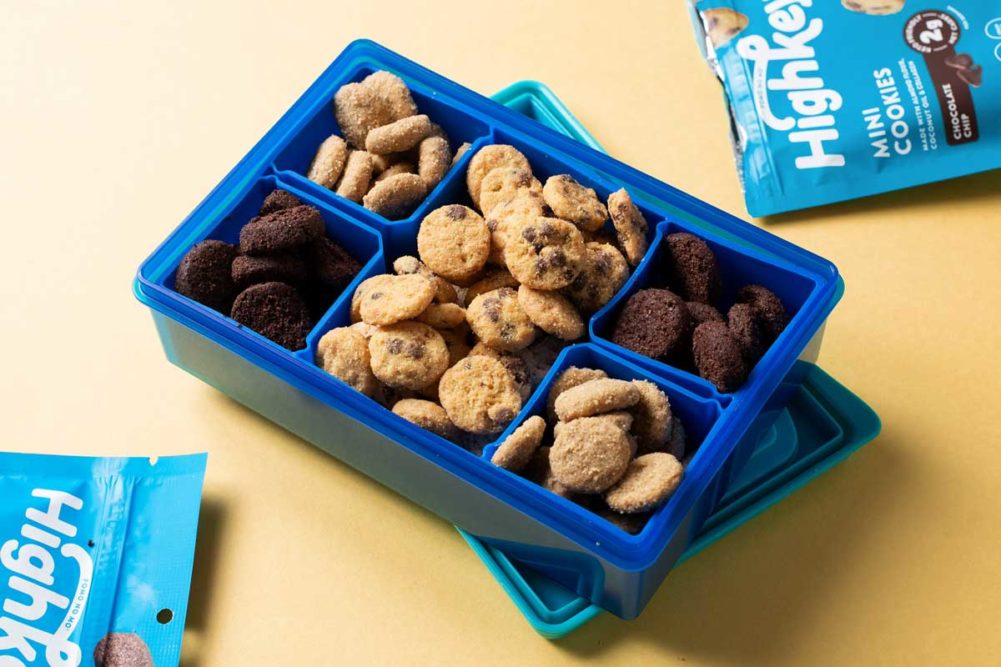Even in the best of times, starting up is hard to do. In the worst of times, it’s almost impossible for incubators to get their emerging brands to market. That’s especially true in today’s Darwinian environment where a lockdown followed by a recession has resulted in clear winners and losers — and everyone else is stuck in between.
Simply put, it’s not the best time to sell something new, but there are always exceptions to the rule.
Fortunately, HighKey got off to a running start since it launched its keto-friendly cookies in early 2019. In fact, Joe Ens, co-chief executive officer, noted that HighKey Mini Cookies has been the No. 1 chocolate chip cookie on Amazon for 16 consecutive months. More recently, the Orlando, Fla.-based company rolled out a Snickerdoodle variety that has become a top-seller on Amazon as well as Brownie Bites followed by ready-to-eat cereal in March. And it’s also expanded the brand into traditional retailers.
Mr. Ens acknowledged that the response to coronavirus (COVID-19) has brought upon a “seismic shift” as retailers focused on merchandising core items and tightened the spigot for new products and upstart brands.
He added it took a little time for everyone to figure out “how the new world” works and how to keep the shelves full.
“The biggest change for a startup, and to some degree big companies, is a slowdown by traditional retailers in bringing on new businesses because there has been so much uncertainty in managing the existing stock as well a shift, albeit short-term, in consumer behavior,” Mr. Ens said.
[Related reading: How HighKey developed the top-selling bakery product on Amazon]
As people settled into a new routine, including online shopping for some, HighKey began to reexperience growth.
“Few things change, but one thing hasn’t: giving consumers what they want and exceeding their expectations,” he said. “That wins pre-pandemic, and that will win post-pandemic, and actually, that wins in the midst of a pandemic.”
Mr. Ens predicted that within the next 12 months retailers will reopen access to their shelves to emerging brands and new products.
“Forward-facing retailers are starting to think ahead to this spring and say, ‘Look. I’m going to have a difficult fall managing through the uncertainty and managing inventory as we did in the initial phase of this pandemic, but I also recognize that this too shall pass,’ and they’re already thinking ahead,” he explained.
That’s a sentiment shared by Tom Vierhile, vice president of strategic insights, North America, Innova Market Insights, who anticipates a pent-up demand for innovation in 2021 from consumers and packaged goods companies. Those incubators that survive may see new opportunities to thrive.
"People get bored. And while they will always eat what is familiar and comfortable, variety-seeking will never go away.”
Linsey Herman, Factory LLC
“Consumers are going to tire of the same dinnertime routine and will hunger for products that can shake things up,” he observed. “Food makers may see new virgin territory to conquer in supermarkets that have suddenly been freed of marginal brands that may have taken up space and delivered little on the sales front.”
Linsey Herman, vice president, product development for Factory LLC, suggested the retail pullback will be short-lived because innovation is vital to attracting consumers back to stores. The Bethlehem, Pa.-based firm invests in and helps scale up high-potential food, beverage and pet food brands that have achieved more than $2 million in sales along with proof of consumer and retailer traction. Currently, its portfolio includes Honey Stinger sports nutrition waffles and chews, Mikey’s gluten-free and dairy free, English muffins, pockets, and Pipcorn Heirloom Snacks, among others.
“We remember what it was like in 2008. when large food companies abandoned new product development,” Ms. Herman said. “Small, disruptive companies moved in to take advantage of the gap in new product offerings. People get bored. And while they will always eat what is familiar and comfortable, variety-seeking will never go away.”
For the immediate future, the pathway to innovation contains several roadblocks. Mr. Vierhile pointed out supermarkets are still recovering from the supply-chain shock from earlier this spring.
“The new product story so far in 2020 is SKU rationalization,” he said. “ ’Big food ‘is taking a hatchet to marginal brands to focus time, energy and resources on brands that can impact the bottom line.”
[Related listening: What comes after Shark Tank? For Brazi Bites, exponential growth]
Mr. Vierhile added that trimming slower-selling products is a healthy practice that should be done from time-to-time. However, COVID-19 turned a pruning process that should occur gradually and made it happen almost overnight.
Then large food companies curtailed innovation. In the United States, launches of food and beverage products have tumbled about 16% for the first six months of 2020 vs. the same period in 2019, according to Innova Market Insights.
“That decline is unlikely to be reversed this year as companies may be more inclined to delay new product launch plans to 2021 to ensure that supply chain issues get sorted,” Mr. Vierhile said.
As stores stocked shelves with core products, some startup brands found their supply chain contracts invalidated due to changing circumstances, and subsequently they were shut out of the market, noted Steffen Weck, president, Food Business Consulting.
“A lot of the brands that had started to show up on the horizon have literally evaporated. We will not see them again,” he said. “We’ve seen lower-level, volume ‘cutesy’ brands have stopped getting distribution as retailers focused on toilet paper and ground beef. Their trucks can hold only so much volume. They couldn’t ship everybody’s quinoa chips.”
This article is an excerpt from the September 2020 issue of Baking & Snack. To read the entire feature on incubators, click here.





